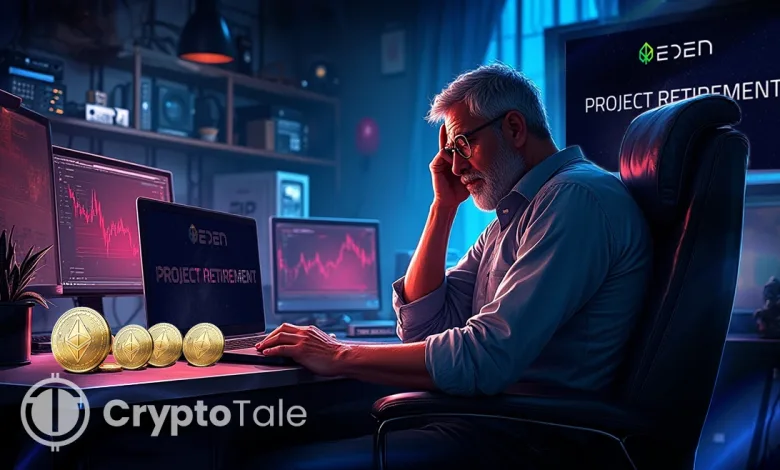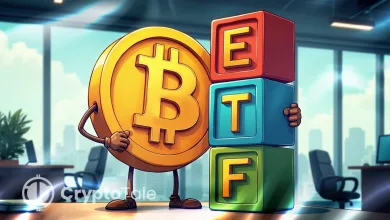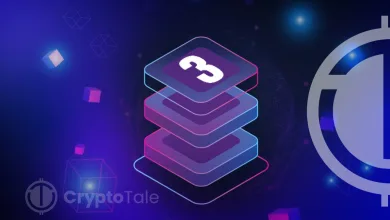Eden Network Exits Ethereum MEV Market Amid Rising Competition

- Eden Network’s 2,000 ETH refund sets a rare example of a transparent wind-down.
- Network closure shows smaller MEV protocols struggle post-Merge due to high costs.
- Eden ends all services and urges users to migrate to Flashbots and Blocknative.
Eden Network, once a dominant player in the MEV sector, has officially ceased operations. This marks a pivotal moment in Ethereum’s MEV market, where rising costs and intensifying competition have challenged smaller protocols. The shutdown comes alongside the announcement of a 2,000 ETH treasury redistribution via a fixed-rate EDEN token retirement program.
EDEN Token Wind-Down Marks Transparent Exit
Eden Network’s closure includes the immediate end of all services and the launch of a final token redemption program. EDEN holders can swap tokens for ETH until September 30(23:59 UTC) through a fixed-rate exchange. The program excludes US participants and only covers the 132.8 million circulating EDEN tokens.
The exchange rate is set at 0.00001506 ETH per EDEN, approximately 66,401 EDEN per 1 ETH. Eden has confirmed that all unvested and treasury-held tokens were burned before initiating the program. Any ETH left unclaimed after the deadline will be used for administrative closure costs.
Such an orderly closure is rare in Web3 and reflects a commitment to transparency, even in winding down. The EDEN token that formed the core of the operations of the Eden Network can now only be used in this one-time swap. The move to refund all the treasury revenues to its holders creates a significant precedent in the decentralized sector.
Discontinued Products and Suggested Alternatives
Eden Network terminated all active products, such as Eden RPC, Eden Rocket RPC, Eden Bundles, Tx Explain, Mempool Stream, and 0xProtect. Users of Eden RPC and Rocket RPC are advised to switch to Flashbots Protect. For those using Eden Bundles, Flashbots Bundles offers a functional replacement. Blocknative Mempool Explorer has been suggested as a viable substitute for Eden’s Mempool Stream tool.
ChatGPT, Grok, or Claude can now handle EVM transaction analysis. Flashbots MEV-Share and Mempool Dumpster offer data alternatives to Eden Public Data. 0xProtect users are encouraged to consult the OFAC sanctions list directly going forward.
Shutdown Reflects Broader Pressure in MEV Sector
Despite strong initial success and dominance in hash power, the team struggled to maintain momentum after the Merge. Following the Ethereum transition to proof-of-stake, Eden shifted its focus to MEV-Boost relay operations. At its peak, the Eden relay recorded the highest average block mining rewards. However, new entrants and soaring infrastructure expenses over the years made it almost unprofitable.
The move by Eden Network reflects the wider challenges of smaller protocols in Ethereum’s changing MEV economy. Eden left with full treasury returns, whereas many projects do not have such capacity. The MEV market is currently becoming less lucrative to smaller, well-funded operators.
Related: Ethereum Hits Record Highs in Japan and Korea as Demand Soars
Eden’s Legacy in Ethereum’s MEV History
According to its white paper, Eden was introduced in 2020 under the name Archer DAO to assist miners in extracting financial value in MEV. Subsequently, after the EIP-1559 upgrade, the project was rebranded to Eden Network and shifted its focus to user protection and mining collaborations. At one point, its network covered over 50% of Ethereum’s hashrate.
Following Ethereum’s Merger, Eden operated one of the most successful MEV-Boost relays. However, maintaining the practice of making blocks in hostile relay fields became impossible. In 2024, Gattaca bought the relay and left Eden to manage the treasury and tokens.
The systematic liquidation of Eden leaves behind lessons on sustainability, transparency, and changing dynamics of blockchain infrastructure. The Eden Network shutdown is also an example of a responsible closure of a project in a decentralized ecosystem.




